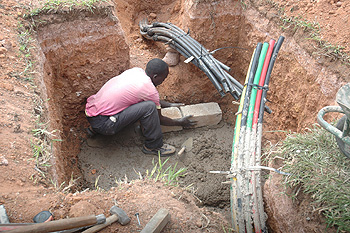The Government of Rwanda (GOR) believes that ICT (Information Communication Technology) for development will facilitate a rapid developmental process that will propel Rwanda past industrialisation and into an information rich society.


The Government of Rwanda (GOR) believes that ICT (Information Communication Technology) for development will facilitate a rapid developmental process that will propel Rwanda past industrialisation and into an information rich society.
2010 has seen the sector move a step to the next level due to much support and government backing to make this goal a reality.
Africa ICT experts met in Kigali
Rwanda hosted a two- week continental training and meetings bringing together the African Network Operators’ Group (AFNOG) and the African Network Information Centre (AfriNIC) ICT experts.
Africa Information Communication Technology (ICT) experts met in Kigali for two weeks training workshop at Kigali Institute of Science and Technology and Serena hotel.
AfriNic which is a body in charge of the management of internet protocol resources hold trainings and discussions on IPV6, the next generation of the internet protocol.
"The 6th version of this protocol will mitigate the effect of the short comings of the currently used 4th version,” noted Geoffrey Kayonga, the CEO of RICTA (Rwanda Information Communication Technology Association).
"We are very grateful towards this opportunity to host such a high level event. There are numerous benefits that we can accrue from the meeting as a country that is very keen on providing skills to her people as an effective approach to create an ICT based-society and economy,” said Ignace Gatare the Minister in Charge of ICT in the office of the President.
Rwanda became the 12th African country to host AfriNIC forum.
All participants were engaged in extensive hands-on training, setting up and managing prototype infrastructure and services, they received training on Unix system administration, Scalable Internet services, Scalable Network Infrastructure and Infrastructure Reseaux IP”
Rwanda fully compliant to IPR’s
As a result of external pressures and to meet its own economic objectives, Rwanda has been moving its intellectual property rights (IPR) regime closer to those found in more developed nations.
"The government of Rwanda is fully complaint to International (IPR’s) because of the IPR’s laws that exists in the country,” David Kanamugire the Permanent Secretary in the Ministry in charge of ICT (Information Communication Technology) in the Presidents office said when he was officiating at a two-day regional workshop aimed at discussing intellectual property issues in Kigali last year.
He added that they passed the IPR’s laws and that Rwanda has fully embraced the protection of them, meaning that they have created necessary legal infringements to protect software developers in the country.
The National fibre optic cable rolls out
The network cable which is expected to enhance the ICT industry by facilitating IT-based foreign direct investments in areas such as business outsourcing which can leverage on the already existing fibre optic broadband infrastructure is in final stages.
The total distance for the optic cable is 2,300 kilometers across the country and the cable is linked to major regional routes that connect Rwanda to her neighbours.
According to Dr. Gatare the entire network will be fully operational by April 2011.
"We are targeting to connect 317 institutions in all 30 districts, 97 in Kigali and 220 outside Kigali, and all the nine Rwandan borders will be connected. But as we are working on connecting more institutions, the number will certainly increase,” he explained.
Once the infrastructure is in place it will boost access to various broadband services including fast tracking government initiatives like e-Governance, e-Banking, e-Learning, e-Health, and other applications.
National Data centre in place.
The Rwanda National data Centre which is set to provide technical support to all Government Ministries and public sector organizations including hosting of all the e-Government services, solutions, applications, web services as well as the server equipment needed to run these services is in place.
The head of the center Charles Gahungu, while addressing the press last year at telecom house said that they have completed the physical construction of the centre.
"Our next step is the construction of the monitoring and operation room which is expected to be done within four months, purchasing IT solutions, installation and commissioning of power transformers and final acceptance testing," Gahungu said.
Gahungu stressed that upon completion, the National Data Centre project will have cost approximately $16m.
Africa Union ICT week observed in Rwanda
During the observation of the African Union ICT Week, in Gasabo district 3D, a local web based engineering services company, began working with carpenters and metal workers in Gakinjiro, Nyarugenge District, to demonstrate modern and efficient methods of working by using computer aided design and manufacturing techniques.
From the 15th to 21st November 2010, craftsmen from Gakinjiro were given hands-on training in how to improve efficiency and consistent production of high quality furniture and metal products by using modern technology.
Rwanda receives additional ICT buses
Rwanda Development Board (RDB) procured two more ICT buses which will facilitate in travelling to rural areas and specifically to remote parts of the country, where they provide training on basic ICT usage and access to information through internet and other multimedia facilities.
Vital information such as the best farming practices, agricultural commodity prices, best health practices and other relevant information are relayed to rural communities through the ICT buses.
The introduction of the ICT buses in the country was to promote usage by farmers, SMEs, school going children, women groups, associations and cooperatives based in under served areas (areas with no electric power, computers and internet).
RDB ICT has now four buses that will enable ICT usage by the people in the rural areas.


